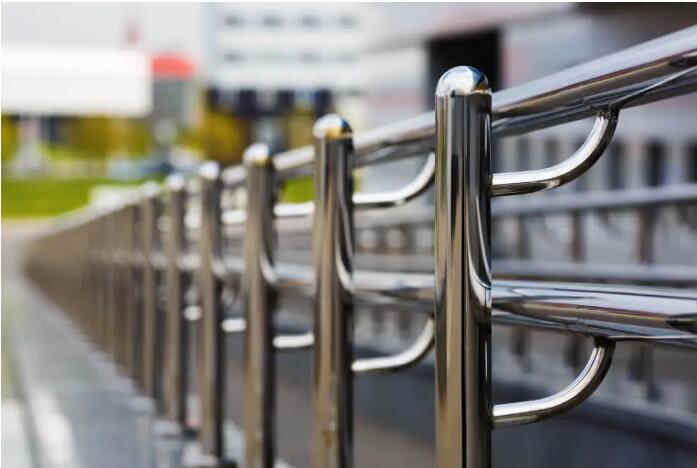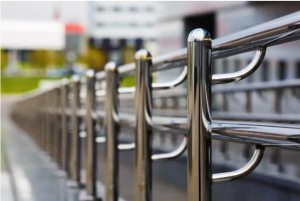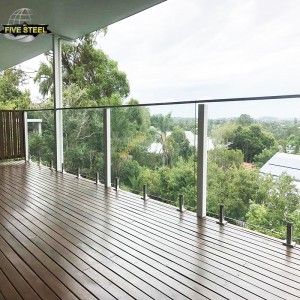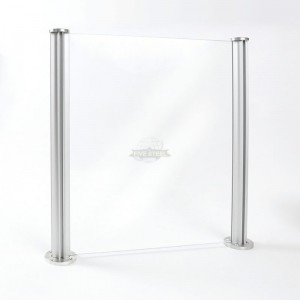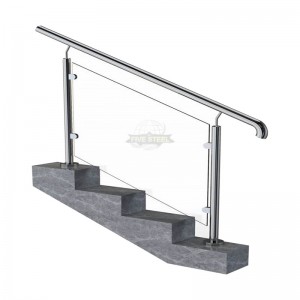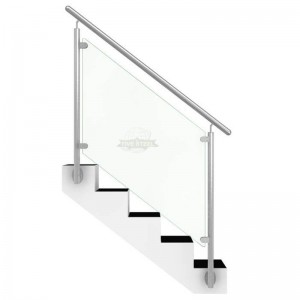China manufacture whole sale 304 316 stainless steel handrail
Short Description:
Product Detail
Product Tags
|
item
|
value
|
|
Warranty
|
5 years
|
|
After-sale Service
|
Online technical support, Other
|
|
Project Solution Capability
|
graphic design, total solution for projects, Cross Categories Consolidation
|
|
Application
|
Office Building
|
|
Design Style
|
Modern
|
|
Place of Origin
|
China
|
|
TianJin
|
|
|
Brand Name
|
FT
|
|
Model Number
|
FT |
|
Mounted
|
Flooring
|
|
Position
|
Bridge Railings / Handrails, Deck Railings / Handrails, Porch Railings / Handrails, Stair Railings / Handrails
|
|
Material
|
304 316 Stainless steel
|
|
Color
|
Sliver
|
|
Finish
|
brush, mirror, brush
|
|
Size
|
Customized Size
|
|
Height
|
1000mm--1500mm
|
|
Usage
|
balcony/stair/lake edge
|
|
MOQ
|
100m
|
Today more than ever, there are numerous material options for commercial railings, but not all of them have the same level of uses. Stainless steel railings offer competitive benefits other materials can’t match.
While other materials can be suitable for specific locations, stainless steel is one of the most versatile and durable materials to use in any space. They don’t easily succumb to corrosion, require little maintenance, and can be cut and welded into various designs. Plus, stainless steel’s sleek design pairs well with other materials—creating a unique aesthetic.
If you’re in the market for commercial railing systems, here are five reasons why you should consider stainless steel.
1) Strength
Out of all railing materials available to architects, stainless steel is the strongest and most durable. To prove this, let’s take a look at its tensile strength compared to aluminum. Tensile strength is measured as force per unit area, and in the International System of Units (SI), the unit is the “pascal” (Pa); a multiple is called “megapascal,” or MPa. The ultimate strength for stainless steel is 590 MPa versus that of 300 MPa for 6061-T6 aluminum.
With a fatigue performance that is twice as great as aluminum, stainless steel railings will provide many more years of safe, aesthetically pleasing use than an aluminum system.
2) Eco-Friendly
For architects looking to use sustainable materials in their designs, stainless steel is a perfect choice. Stainless steel is 100% recyclable and can be recycled to make more steel materials without losing its quality.
Not only is it created from sustainable sources, but 92% of stainless steel used in architectural projects is reused and recycled. Stainless steel proves to be quality material that meets the mark on performance while being environmentally friendly.
3) Affordability
While stainless steel might not be the cheapest option at its initial price, its durability and low maintenance makeup for the cost.
Stainless steel can endure harsh weather and will not crumble, fracture, or bend over time. Because stainless steel is a strong material, posts and handrails can be constructed much thinner than other railings. A “strength equivalent” steel post is 50% thinner than an aluminum post.
Stainless steel requires little maintenance as well. A simple and free way to keep railings and posts looking like new is routinely wiping them down with a damp cloth.
4) Aesthetics
Stainless Steel Mirror Finish
Stainless steel railings offer a sleek and modern aesthetic to any contemporary design. They are not easily damaged and do not wear and tear, ensuring your design will remain visually pleasing for a longer period of time.
These railings are typically offered in a wide variety of design options. Whatever your preference is, stainless steel can be customized to match it. Its simple design allows it to match well with various infill options, including glass, cable, panels, and bars.
5) Design Diversity

Stairs beautiful interior of modern hotel with use of metal
Stainless steel railings can be offered as prefabricated or custom design systems.
When choosing custom prefabricated railings, you are ordering a custom-designed railing system where pieces are pre-fabricated and put together per the approved railing specifications. The customization is achieved by the designer picking and choosing the various components to create the railing systems. These systems are typically pre-tested and approved to meet specific building code requirements.
Additionally with prefab railings there is typically more labor on the jobsite which could off-set the price difference from custom fabricated railings.
Custom-designed stainless steel railings are designed and fabricated in-house, typically welded instead of using fasteners. Some of the advantages of custom over prefabricated include the following:
Can offer better structural integrity
Offers lower maintenance and repairs
Can be build to specific project specifications
Installation cost is typically lower
Lead times can be comparable to pre-fabricated systems if component parts are coming from outside the country
Custom-designed Stainless Steel railings can offer the architect and owner a unique railing system that offers durability and longevity.
Selecting the Stainless Steel Finish
Choosing the right finishing can ensure your railings have a long lifespan, are corrosion resistant, and are low maintenance. The most common stainless steel finishes for architectrual railings are #4 brushed polish finish, #6 fine-brushed finish and #8 mirror polish finish.
Choosing the Right Stainless Steel Grade

Stainless Steel Metal Rolls
Before ordering your stainless steel railing system, there are a few factors to consider.
Stainless steel comes in different grades based on its alloying elements. Each offers benefits that increase its strength, wear, and corrosion resistance. When it comes to architectural railings, the two most common stainless steel grades are 304-grade and 316-grade. For extreme marine environments 2205-grade which is a Duplex Stainless Steel offer the highest corrosion resistance and has become the preferred choice for ocean side and extreme corrosive environments.
Stainless steel 304-grade railings are often used in outdoor areas where they are unaffected by harsh weather conditions. They are also a popular choice for indoor railings and only require regular cleanings with soap and water.
Stainless steel 316-grade railings are perfect for industrial applications or outdoor locations. It works well in harsh weather environments due to its high corrosion resistance. However, both 304 and 316-grades may be susceptible to corrosion if exposed to high-salt areas. This is when 2205 is the grade of choice.
When choosing stainless steel railings, you ensure a modern design and durable system that will serve its purpose and stay shining for years.



